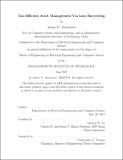Tax-efficient asset management via loss harvesting
Author(s)
Anastasov, Anton G
DownloadFull printable version (1.217Mb)
Other Contributors
Massachusetts Institute of Technology. Department of Electrical Engineering and Computer Science.
Advisor
Andrew W. Lo.
Terms of use
Metadata
Show full item recordAbstract
In this thesis, we study loss-harvesting--an investment strategy that realizes capital losses immediately but defers realizing capital gains as long as possible. We begin by describing a computational framework for studying the properties of loss-harvesting empirically. The main advantage of our framework is flexibility. In particular, our framework is independent of any particular choice of a source for stock return time series. After combining the framework with the Capital Asset Pricing Model as a source for simulated stock returns data, we perform a thorough sensitivity analysis and study the performance of loss-harvesting under various conditions of the financial market. By combining the framework with historical stock return time series from the S&P 500 Index, we study the performance of loss-harvesting from a different and more practical, point of view. Through this empirical exploration, we identify three new findings about loss-harvesting: (1) introducing a transaction cost rate of 1% reduces alpha by about 50% after taxes; (2) introducing regular cash contributions reduces alpha after taxes; and (3) under specific market conditions, a simple passive buy-and-hold investment strategy outperforms loss-harvesting.
Description
Thesis: M. Eng., Massachusetts Institute of Technology, Department of Electrical Engineering and Computer Science, 2017. This electronic version was submitted by the student author. The certified thesis is available in the Institute Archives and Special Collections. Cataloged from student-submitted PDF version of thesis. Includes bibliographical references (page 63).
Date issued
2017Department
Massachusetts Institute of Technology. Department of Electrical Engineering and Computer SciencePublisher
Massachusetts Institute of Technology
Keywords
Electrical Engineering and Computer Science.